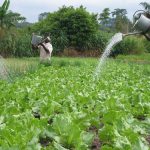
Ghana’s government has introduced the “RedGold” policy to reduce its $2 billion annual palm oil import bill by enhancing domestic production and diversifying into high-value tree crops.
The policy seeks to close the gap between domestic production and consumption, which currently stands at 50,000 metric tons compared to 250,000 metric tons.
To support this initiative, the government plans to provide 1.5 million oil palm seedlings to farmers, promote large-scale out-grower plantation schemes, and offer incentives to increase local refining capacity.
This initiative is expected to create thousands of rural jobs, attract private sector investment, and contribute to Ghana’s agro-industrial transformation agenda.
The “RedGold” policy is part of the Ghana Tree Crops Diversification Project, which aims to improve farmers’ incomes and generate foreign exchange through the commercial cultivation of crops such as cashew, coconut, rubber, mango, and shea.
By 2025, the government aims to distribute 5.07 million seedlings across the country, including 2 million cashew seedlings, 1.65 million rubber seedlings, and 1.42 million coconut seedlings, targeting 500,000 farmers.
This initiative could position Ghana as a net exporter of palm oil in the medium term while also boosting foreign exchange earnings from other high-value crops.









